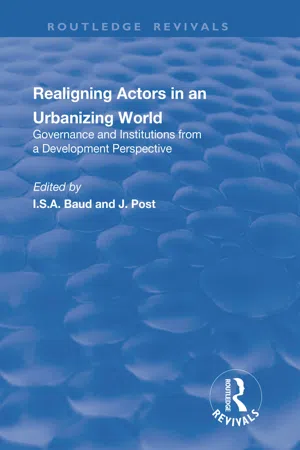
- 438 pages
- English
- ePUB (mobile friendly)
- Available on iOS & Android
About This Book
This title was first published in 2003. In the 1980s, discussions on urban, regional and international development were dominated by those advocating liberalism and free markets. In the 1990s, the experiences of many countries from the previous Soviet Union and those following socialist development models in the South have led to a renewed interest in the democratic institutions that underpin economic development processes. Thus, the state has come back into focus as an "enabler", a co-ordinating agency working with a variety of other organizations in different forms of partnership aimed at urban and regional development. At the same time, increasing disparities between rich and poor have led poor urban households to organize collectively against poverty and to promote community and neighbourhood development. This title examines how both these processes take place, looking at patterns of fundamental re-aligning between state, civil society and the market in an integrated manner. It focuses on urban and regional development, because at the local and regional levels the direct interface between local government, the local and global market, and civil society organizations occurs. The question of re-alignment is considered from three main perspectives: governance and community organization issues at local level, urban areas as motors of economic development and their interface with globalization processes, and urban areas as the nodes of regional development. In each part of the book, one of these perspectives is taken. The contributions of the different authors are grouped around these complementary perspectives. Changing alignment patterns also have far-reaching implications. In the last section, the relation between research and policy around these issues is considered, based on reflections by policy makers and academics who have been influential both nationally and internationally.
Frequently asked questions
Information
Table of contents
- Cover
- Half Title
- Title Page
- Copyright Page
- Table of Contents
- Foreword
- 1 Evolving Views in Urban and Regional Development Debates in Africa, Asia and Latin America: Introducing the Key Themes
- Part I Urban Economies and the Local-Global Interface
- Part II Local Governance, Partnerships and Urban Development
- Part III Livelihoods, Rural-Urban Linkages and Regional Development
- Part IV Urban Poverty Reduction: Mapping the Policy Arena
- Index